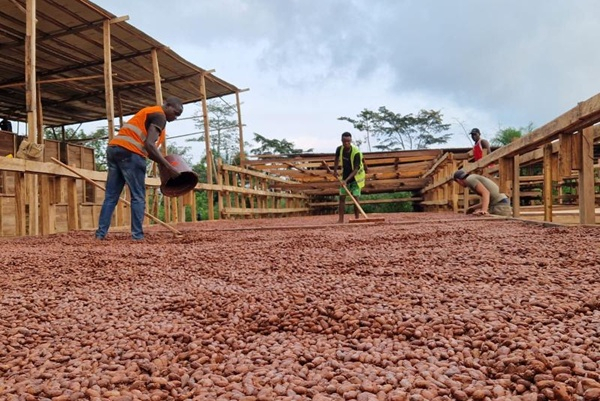The export price of cocoa from the Democratic Republic of Congo (DRC) has fallen sharply, the latest index from the Ministry of Foreign Trade shows, cutting payments to local farmers.
Between October 20 and 25, 2025, the official price for high-quality cocoa beans ranged between $5.30 and $5.60 per kilogram at border points such as Matadi, eastern DRC, and Zongo, a 40% drop from the June 23-28 period. All grades of cocoa have been affected.
Producers have been hit hard. In Ituri province, prices paid to farmers plunged from 20,000 Congolese francs to 6,000 francs (about $2.70) per kilogram across the Irumu and Mambasa territories.
Dieudonné Kambale, an agronomist with eastern exporter ESCO Kivu, says that weak local processing is partly to blame, according to 7sur7.cd. Many farmers sell beans just two or three days after harvest, drying them directly under the sun instead of letting them ferment for a full week. That same concern was raised in July by Mumbere Musumba Jackson, head of the regional agricultural and perennial produce buyers’ association.
Kambale also pointed to rising output across Africa. Favorable weather in West Africa, the world’s top-producing region, and progress against the swollen shoot virus that had suppressed yields are boosting confidence among major buyers.
Côte d’Ivoire and Ghana both expect strong harvests, with Ghana’s agriculture minister expecting output to exceed 650,000 tons in the 2025/26 season, according to Ecofin Agency.
Industry Shifts to Cocoa Alternatives
Global chocolate makers are also moving to reduce their reliance on cocoa beans and butter, experimenting with substitutes such as cocoa pulp and vegetable oils. In August, Nestlé, one of the world’s top five confectionery companies, unveiled a new chocolate recipe using 30% cocoa fruit derivatives, including pulp previously discarded. The step is meant to cut the share of cocoa beans in its products.
These global trends come as the DRC pursues an ambitious goal of becoming the world’s top cocoa producer within five years. Agriculture Minister Muhindo Nzangi recently reaffirmed the target of 3 million tons by 2030, up from 100,000 tons in 2024, according to ministry data.
To reach that goal, the government plans to form a special brigade to protect plantations from ADF rebel attacks, which authorities say are partly financed by cocoa. Other measures include cutting export paperwork to 24 hours and reviving the Bengamisa (CABEN) plantation in Kisangani, Tshopo province, by redeveloping 5,000 hectares left idle for 25 years.
Timothée Manoke










